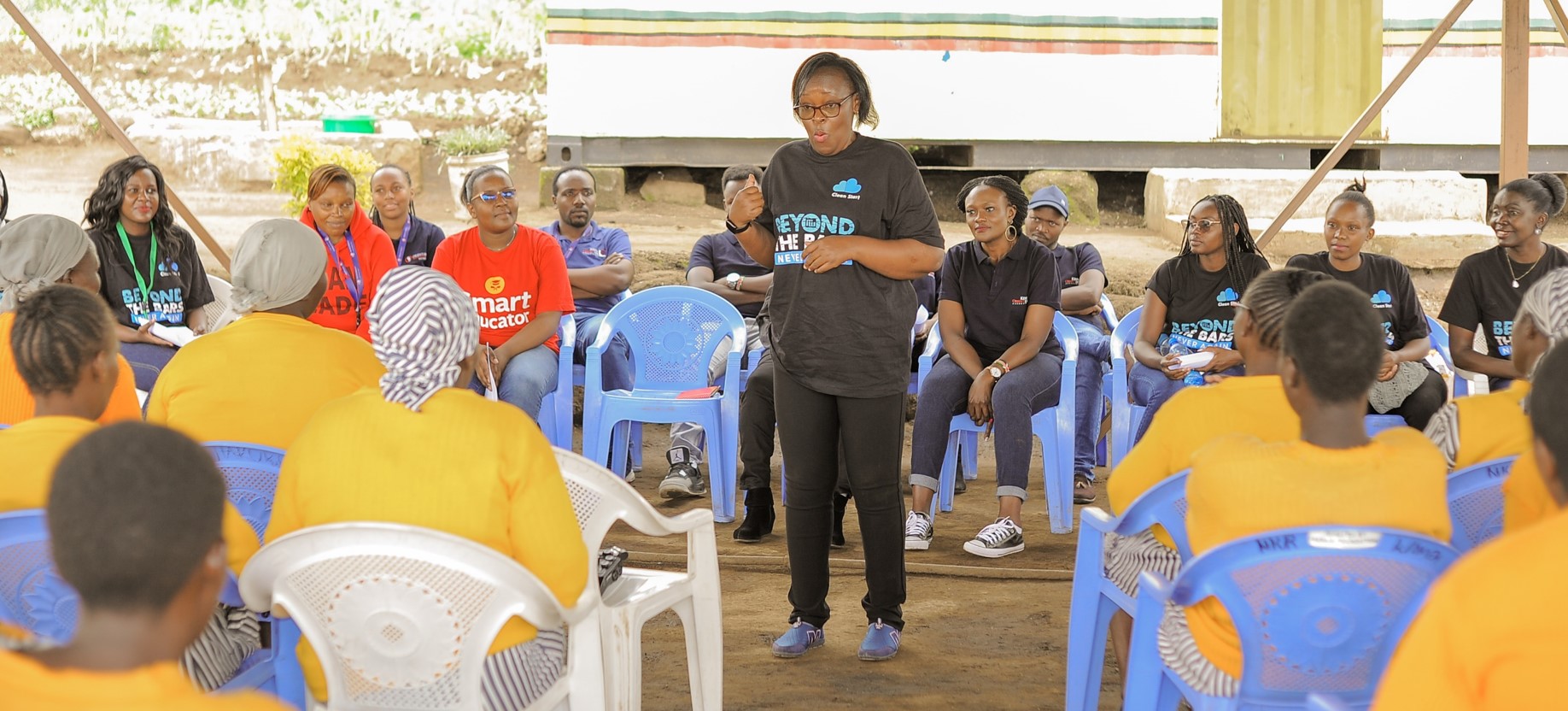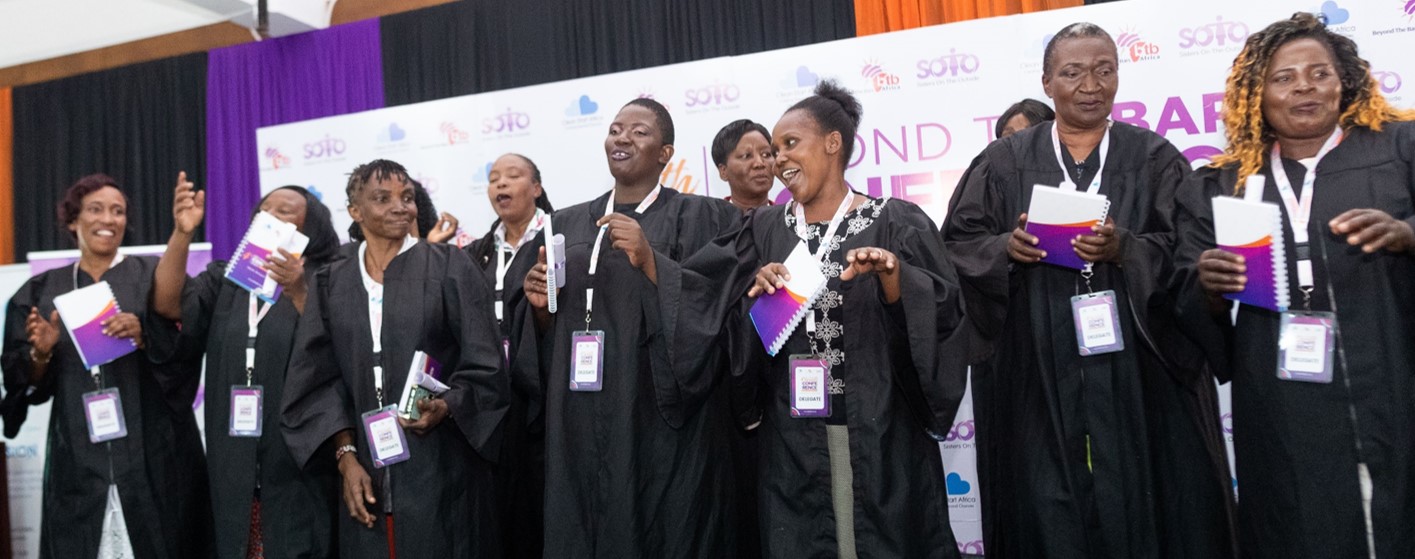
About the Together Women Rise Grants Program
The Together Women Rise Grants Program has two key components that support our overall mission to achieve global gender equality. Featured Grants are largely focused on delivering direct services by funding grassroots organizations that empower and support women and girls in low-income and marginalized communities in the Global South. Our Transformation Partnerships are designed to invest in areas where we can make the biggest impact on achieving global gender equality by addressing the root causes of gender inequality.
Through our Featured Grants Program, we highlight a different organization/project each month, providing a variety of learning materials on the issue and how the grant will be used. Through the Featured Grants program, we support capacity building, new programs, or expansion of existing programs. The following is information on the grant we are featuring for January 2025.
The Global Issue
Poverty, Incarceration, and Reintegration of Women
| “I came out of prison a different woman. I lost friends. They didn’t want to be associated with someone thought to be a criminal.”
Clean Start Africa Founder Teresa Njoroge |
More than 740,000 women and girls are in prison globally – up 17% since 2010 – and the number is growing. Since 2000, the number of women and girls imprisoned has grown by approximately 60%, while the male prison population has increased by around 22%. Most female prisoners are profoundly vulnerable. They are typically poor, may have mental illness, and/or have endured sexual and physical abuse. Sadly, incarceration does not just affect the women themselves. Their children and communities also suffer.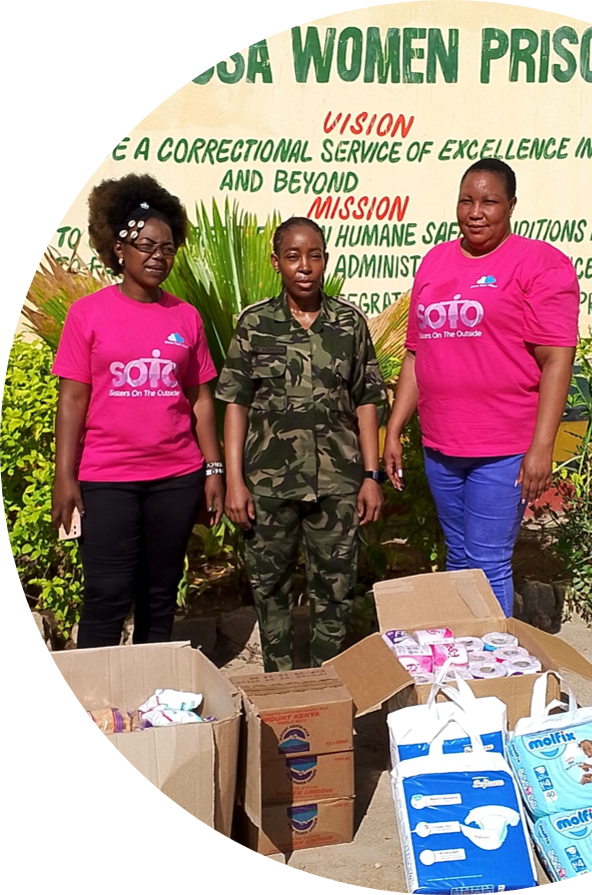
Poverty and incarceration are inextricably linked. Impoverished women may commit offenses such as low-level drug activities as a means of survival for their families. These women can neither pay fines for petty crimes nor afford to pay bail. In addition, some countries imprison women for “status offenses” such as adultery, prostitution, or other behavior considered unseemly. According to the World Health Organization, up to 80% of women in prison have an identifiable mental illness, and they are more likely than men to harm themselves or die by suicide. Due to entrenched gender norms, incarcerated women face greater stigma than men and endure greater hardship. For example, in many countries women regularly visit their husbands in prison, but husbands rarely visit their wives. Children are also victims. Not only is being separated from a mother traumatic and life altering, but some women lose custody of their children even after a short stay in prison.
The suffering does not end when women return home, as it is extremely challenging for these women to rebuild their lives. After incarceration, women experience high rates of economic hardship, parenting challenges, mental health issues, social stigma, community rejection, limited access to housing, and higher rates of recidivism. These women desperately need gender-responsive programs designed specifically to address their trauma and family dynamics so that they may successfully integrate back into society, as well as job training and support to allow them to support themselves and their families with dignity.
| The rate of female incarceration in the U.S. far outnumbers that of other countries. The U.S. has only 4% of the world’s females but 30% of the world’s incarcerated women. Even the states with the lowest rates of incarceration far exceed the rate of female incarceration around the world. Multiple factors are said to drive these numbers, including drug enforcement policies and substance use. Even as many states have reduced the growth of men’s prisons, there remains a gender divide. Read more from the non-profit, non-partisan Prison Policy Initiative. |
About Our Grantee
Together Women Rise is funding a $45,000 Featured Grant to Clean Start Africa.
Clean Start Africa works with women, girls, and children impacted by the criminal justice system to restore their dignity and hope for a successful reintegration. It addresses systemic and socio-economic injustices that lead to the imprisonment of the vulnerable and poor, through advocacy, bridging the capacity gap to mitigate the limited capacity of prisons to rehabilitate and reform inmates. Clean Start Africa offers a variety of programs including Dignified Rehabilitation (mental health support and trauma healing), Dignified Re-entry (economic empowerment, peer support, job training and placement, and financial literacy), Children and Girls (enhancing family bonds, improving the well-being of mothers and children, and facilitating successful reintegration upon release), and SOTO – Sisters On The Outside (a support community for women who were formerly incarcerated).
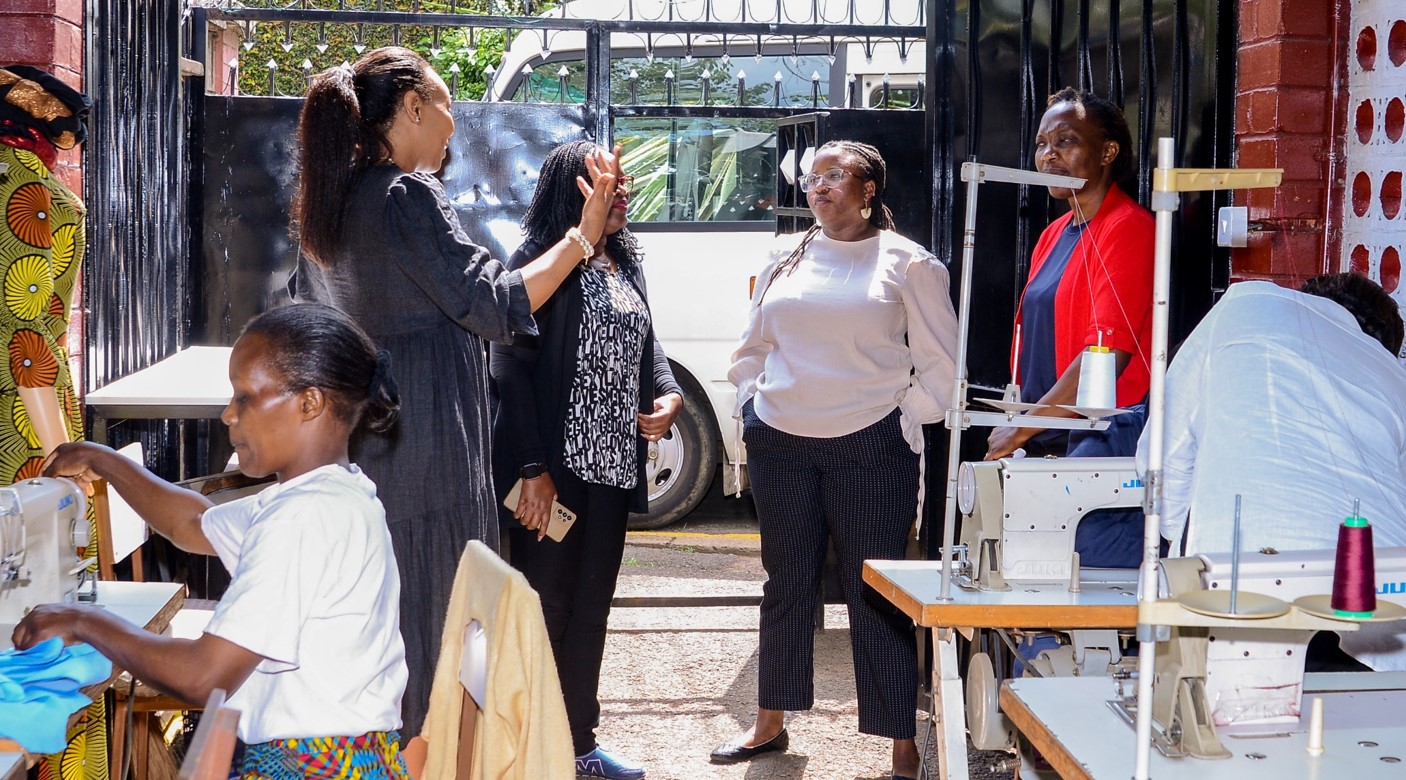
The organization was founded by Teresa Njoroge, who currently serves as CEO. In 2009 – after being falsely accused of, maliciously prosecuted, and sentenced for a crime she did not commit, Teresa Njoroge and her three-month old baby began a one-year sentence in Nairobi, Kenya. This experience inspired Teresa to devote her life to helping imprisoned and formerly imprisoned women to reintegrate back into society, which led to the founding of Clean Start Africa. Read more about Teresa’s story.
Today, 80% of the organization’s staff are women who were formerly imprisoned. Teresa is a TED Speaker, and she and Clean Start Africa have received numerous awards.
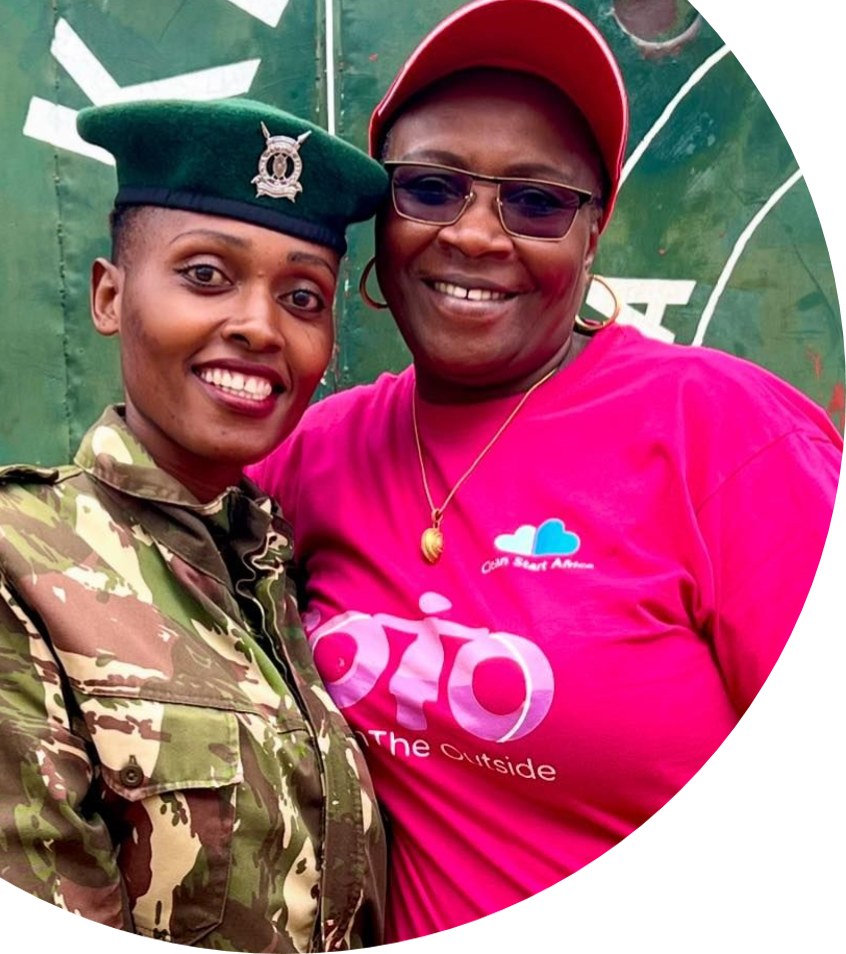 To date, Clean Start Africa has had a positive impact on over 4,000 women who have been supported with spiritual and emotional care, mentorship, dignity packs, and life skills training. Their programs are offered in Kenya, Uganda, and Malawi.
To date, Clean Start Africa has had a positive impact on over 4,000 women who have been supported with spiritual and emotional care, mentorship, dignity packs, and life skills training. Their programs are offered in Kenya, Uganda, and Malawi.
LEARN MORE ABOUT CLEAN START AFRICA
Life Challenges of the Women & Girls Served
- Clean Start Africa serves women, girls, and children in peri-urban (areas on the outskirts of cities or large urban areas) and rural areas where economic hardship and social marginalization are prevalent.
- Within this community, 74% of these women have been imprisoned for petty, survival-related offenses, such as selling illicit home brews or shoplifting, underscoring their low-income status and vulnerability.
- Notably, 90% of these women are mothers and single parents, bearing the sole responsibility of providing for their families alone.
- Upon release, these women often turn to small-scale ventures such as hawking (street vending) and selling groceries to make ends meet. Many belong to minority groups, including refugees and internally displaced persons, which further compounds their challenges.
- The stigma and isolation after release too often leaves women trapped in a cycle of poverty and marginalization which is then passed down to their children.
Snapshot of imprisoned Kenyan women:
- 81% had no legal representation
- 22% will be reincarcerated, often within three years
- 60% of their children are under 10 years old
- 39% do not know the whereabouts of their children
- 90% are single parents and breadwinners
- 69% are 20 to 39 years old
- 70% were imprisoned under one act alone: The Liquor Act, for selling illicit brews, which is often driven by their need to earn an income
- 74% of imprisoned and formerly imprisoned women live on about US $2.30 per day
Half a million formerly imprisoned women need support.
How the Grant Will be Used
Together Women Rise’s $45,000 Featured Grant to Clean Start Africa funds Beyond The Bars: Sustainable Livelihoods for Women Leaving Prison, an economic empowerment program designed to provide sustainable economic opportunities and dignity to women transitioning out of prison in Kenya. The program addresses systemic socio-economic injustices and inequalities that contribute to the incarceration and recidivism of these vulnerable women.
This project aims to equip formerly imprisoned women with skills and foster economic independence. It includes business options and vocational training in six business tracks: interior design, African cuisines, beauty and hairdressing, green energy, blue economy (sustainable use of ocean resources for economic growth), and fashion design.
Skill-building: This project will provide 500 entrepreneurship starter kits and 150 vocational training sessions across the following business tracks: beauty and hairdressing, culinary, textile/fashion, and briquette making (providing clean renewable fuel).
Starter kits include equipment, supplies, and setup for their new business, such as hair dryers, salon chairs, washing stations, and products for hairdressing/beauty, or appliances, furniture, and initial food stock for culinary work.
Each participant will receive training materials, toolkits, and resource guides to support their skill development. After the training, women are linked to job opportunities and supported in starting and running their own businesses.
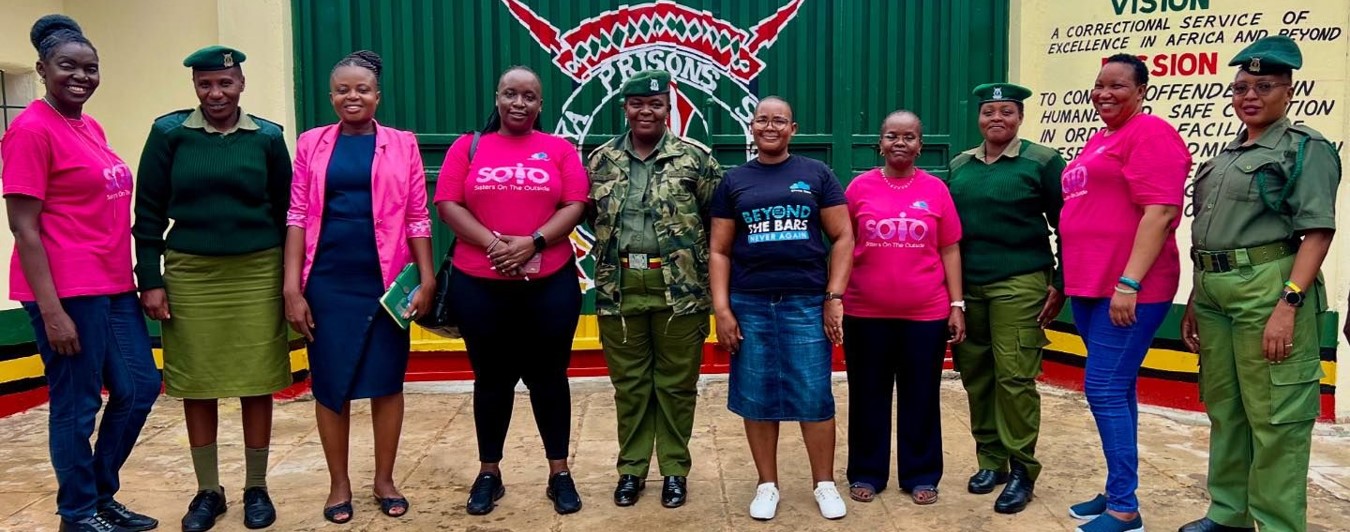
In the first year of this two-year project, Clean Start Africa will recruit and train 400 women. In year two, the program will expand training, provide mentorship, and link the women to job opportunities and entrepreneurship. The project aims to equip the women to secure sustainable livelihoods upon reintegration. The programs offer a lifeline, helping women navigate the stigma and isolation they face post-release.
Psychological support: To address participants’ mental health needs, Clean Start Africa will offer 50 group therapy sessions and 100 individual counseling sessions.
Advocacy: Women receive continuous mentorship and Clean Start Africa advocates for policies supporting reintegration. This amplifies stories of resilience, hope, and change among formerly imprisoned women, pushing for policy changes and prison reforms. In addition, Clean Start Africa’s work towards gender equality ensures that women have the tools to overcome stigma, isolation, pain, abandonment, and other social challenges to live with dignity.
This program will have a direct impact on 600 women and girls and an indirect impact on 2,400 women and girls. The anticipated outcomes include:
- 50% reduction in recidivism
- 80% reporting improved relationships with their families and communities
- 70% having improved quality of life (education, health, and housing)
- 80% having increased access to savings and ability to access small business loans
- 90% having increased household income
Budget
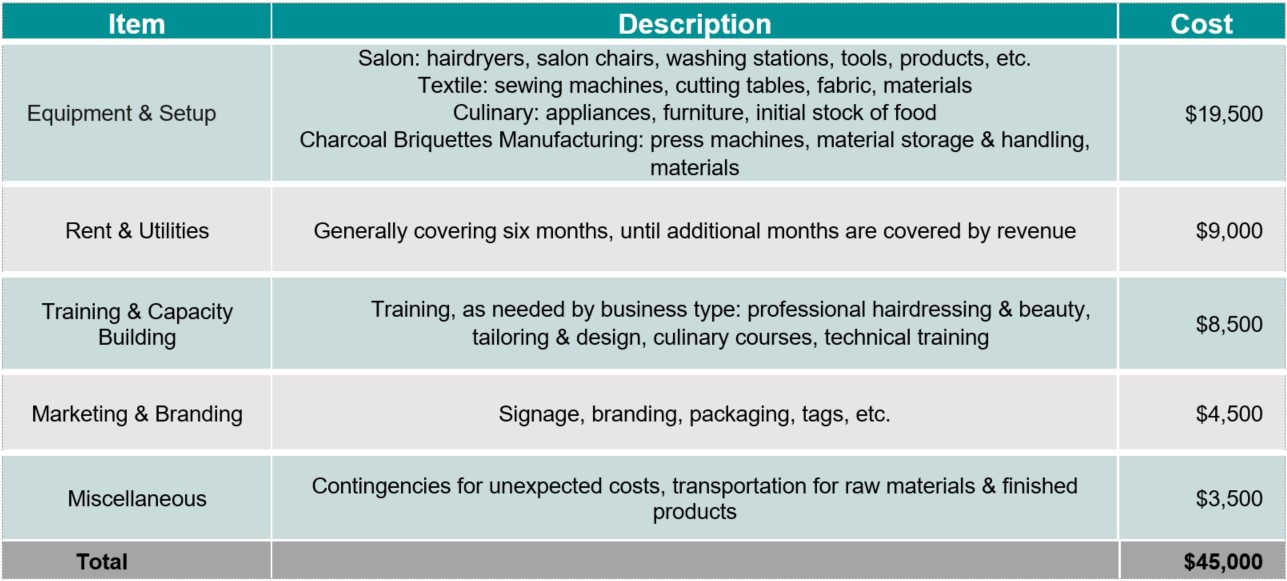
Why We Love This Project/Organization
We love that this project works directly with women in prison or recently released, helping them obtain gainful employment and increased self-esteem. Notably, the incarceration of many women imprisoned in Kenya is directly related to poverty.
Impact Story
Meet Beatrice
Beatrice is a resilient, 52-year-old living in Nairobi. Her story is one of endurance, determination, and the power of support systems to rebuild a life once derailed.
Beatrice’s challenges started early. Married with three children, ages 12 to 16, she faced devastating hardships following her divorce in the early 2000s. Without formal education or vocational skills, she was desperate and lacked options.
In her struggle to help her family survive, Beatrice learned to shoplift from supermarkets. Between 2007 and 2013, she was repeatedly arrested and charged with petty theft, serving multiple sentences of six months, eight months, and up to a year. Trapped in a cycle of crime and poverty, she eventually escalated to fraud, which led to her imprisonment at Lang’ata Women’s Maximum Prison in 2014, where she served a three-year sentence.
While in prison, Beatrice found the time and space to reflect on her life. It was during this period that she learned about Clean Start Africa and their work with women impacted by the criminal justice system. Inspired by their mission, she resolved to chart a new course once released, marking the beginning of her incredible transformation.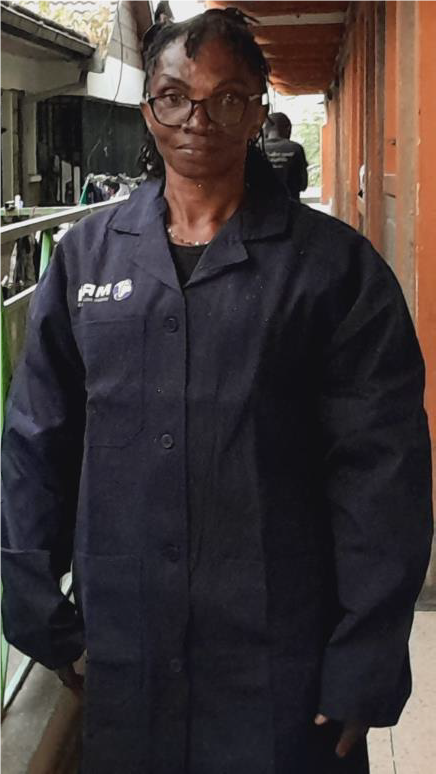
In 2018, a year after leaving prison, Beatrice enrolled in Clean Start Africa’s Ufunuo Leadership Program, which offered emotional and mental wellbeing support while equipping her with the tools to heal and rebuild her confidence.
Beatrice also became an active member of a peer support group through Clean Start Africa. The 10 women meet regularly to share experiences, encourage one another, and learn collectively. These peer connections have proven to be a lifeline, strengthening Beatrice’s sense of belonging and purpose.
Recognizing Beatrice’s potential, Clean Start Africa helped her enroll in carpentry training in 2022 through a partnership with BuildHer, a vocational training organization. After four months of intensive training, she graduated with technical skills that opened new doors. She secured a job at a carpentry workshop, enabling her to provide for her family and rebuild her life with dignity.
Today, Beatrice is not only financially independent but also an inspiring role model for others who have faced similar challenges. She lives with and helps support her divorced daughter and her grandchildren. Beatrice credits Clean Start Africa and its supportive community for helping her rise above adversity.
| “I am really grateful for the opportunity Clean Start has given me. The skills I learned have made my life better. I can now earn a living and support my family.”
– Beatrice |
Learn More
Source Materials
https://store.samhsa.gov/sites/default/files/pep20-05-01-001.pdf
https://www.penalreform.org/issues/women/
https://www.prisonpolicy.org/global/women/
https://www.sentencingproject.org/fact-sheet/incarcerated-women-and-girls/
https://www.icpr.org.uk/news-events/2022/world-female-prison-population-60-2000
https://store.samhsa.gov/sites/default/files/pep20-05-01-001.pdf
Glossary
The Global South: The Global South includes the countries that experience higher levels of poverty, income inequality, lower life expectancy, and harsh living conditions compared to the wealthier nations in the “Global North” – located mostly in North America and Europe. The Global South primarily includes many of the countries in Africa, Latin America, the Caribbean, Asia and the Pacific, and the Middle East.
